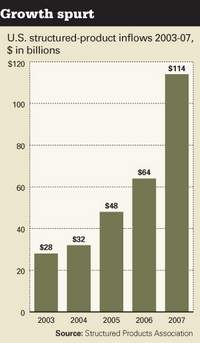by Murray Coleman
Even after Lehman Brothers filed for bankruptcy protection on Sunday, the investment banks' asset management business was being shopped Monday to a host of interested parties.
Along those lines, a still-lucrative part of Lehman that could also help attract buyers is its indexing products group. The unit, which began some 35 years ago, maintains and publishes thousands of indexes that are used around the world by both active and passive money managers to track different markets.
According to Lehman's estimates, the group had a total of roughly $6.9 trillion benchmarked to those products by the end of last year.
In particular, the Lehman brand has become known for its expertise in covering fixed-income markets. It was the first to publish a total return bond index, and the Lehman Brothers Aggregate U.S. Bond index remains the de facto standard for broad indicators of fixed-income markets for advisors and managers domestically.
The indexing group is considered part of Lehman's fixed-income research unit. That's separate from the firm's asset management group and part of the broker-dealer side of the business. On Monday, The Wall Street Journal reported that several rivals could be interested in buying different parts of Lehman. Specifically, it pointed to the asset management arm. The report listed Bain Capital, Hellman & Friedman and Clayton Dubilier & Rice as possible suitors.
"Everyone uses their bond indexes. You'd have to assume that would be a pretty attractive asset to come out of bankruptcy or attract another party if Lehman decides to sell-off parts of its business," said Raymond Benton, a Denver-based advisor.
Portfolio managers at Compass Efficient Model Portfolios aren't too concerned about the fate of Lehman's indexing services, either. The Nashville, Tenn.-based money manager oversees about $3 billion in assets for advisors and institutions around the country.
"To us, having Lehman on the name of an index is similar to walking into a stadium with a company's name on the outside," said Steve Hammers, chief investment officer at Compass.
"Lehman doesn't own every bond in their indexes. So this is more of a marketing and services story than anything."
Big institutions pay Lehman to get data to put together and keep their bond indexes running, he noted. "If Standard & Poor's goes under, it's not going to impact the companies in the S&P 500," said Hammers. "It might affect the market, but Lehman's indexing group is still going to be a valuable commodity."
He points out that while stock indexes have been plummeting this year, fixed-income benchmarks tied to Lehman's most popular products have largely been in the black. "Lehman's indexing group is a long-standing name in the industry," Hammers said. "As Lehman tries to liquidate its assets, their brand is still going to be worth something."
He thinks a possible suitor might be Citigroup. "We have 2,200 indexes in our database, and they're the largest provider of fixed-income benchmarks," Hammers said. "So it would make a lot of sense for Citigroup to really take advantage of this situation."
Lehman used to be the biggest provider in fixed-income, he says. But since the early 1980s, when Citigroup started publishing its U.S. fixed-income indexes, the firm has come on strong.
"Lehman had a better-than 10 year jump on Citigroup in terms of getting into the U.S. bond indexing market," Hammers said. "But Citigroup now has 380 major U.S. fixed-income benchmarks that we're aware of through our various subscriber services. So it's fair to say that Citigroup has really built out their fixed-income indexing operation."
But he says that Lehman still has the advantage of being able to attract monster assets and fees from a smaller number of popular longstanding industry benchmarks. That gives the indexing pioneer a large asset base that could prove enticing to possible buyers.
"In sheer numbers of indexes, Citigroup actually has built a bigger presence in the bond world," Hammers said.
Credit Suisse is another major player in bond indexes that might be a possibility, he adds. So could Dow Jones, which is big in the equity world, according to Hammers.
Other notable indexing players he lists as possibilities include Merrill Lynch, which his analysts estimate has about 60 major bond benchmarks. "But I doubt they'd be interested right now. They've got too much going on right now and it would probably come down to Bank of America's decision in the end," Hammers said.
Gary Gastineau, head of ETF Consultants, notes that Lehman's index services business probably makes more sense to suitor already in the bond industry. But anyone interested in moving into the fixed-income brokering arena, he adds, might want to double-dip.
"Somebody who wanted to get into the bond industry might find Lehman's index business a nice add-on," said Gastineau. "But I don't think they'd want to do the index piece without also picking up Lehman's bond trading operation. And both are very strong parts of the existing company."
Some of the most popular bond exchange-traded funds use Lehman indexes. Those include the iShares Lehman Aggregate Bond index (NYSE: AGG) and the Vanguard Total Bond Market ETF (AMEX: VTI).
"Even if it goes to bankruptcy, Lehman doesn't hold any of the assets - iShares and other ETF providers do. So what investors need to worry about is the remote possibility that Lehman stops providing the underlying indexes," said Michael Krause, president of AltaVista Independent Reasearch in New York City.
In that case, the bond funds would simply convert to using another firm's benchmarks since plenty of competitors are waiting in the wings to snatch some of Lehman's market share, he added.
Krause doubts that's going to happen, however. "Someone will be interested in a healthy and I'm sure profitable Lehman indexing services business," he said.
For the original posting on IndexUniverse.com, click here.
Monday, September 15, 2008
Subscribe to:
Post Comments (Atom)




No comments:
Post a Comment